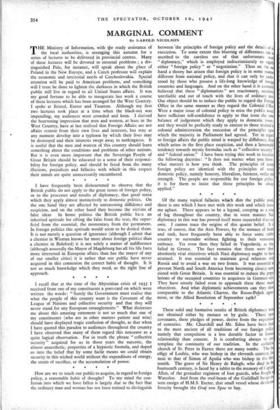I have frequently been disheartened to observe that the British
public do not apply to the great issues of foreign policy, or to the processes and results of diplomacy, that good ' sense which they apply almost instinctively to domestic politics. On the one hand they are affected by unreasoning diffidence and suspicion, and on the other hand they become the victims of false ideas In home politics the British public have an inherited aptitude for sifting the false from the true, the super- ficial from the essential, the momentary from the permanent. In foreign politics this aptitude would seem to be denied them. It is not merely a question of ignorance (although I admit that a chemist in Wisman knows far more about foreign politics than a chemist in Bideford) it is not solely a matter of indifference (although assuredly the Mayor of Magdeburg has all his life been more interested in European affairs than has the mayor of any of our smaller cities) it is rather that our public have never acquired in this connexion the correct habit of thought. It is not so much knowledge which they need, as the right line of approach.


























 Previous page
Previous page